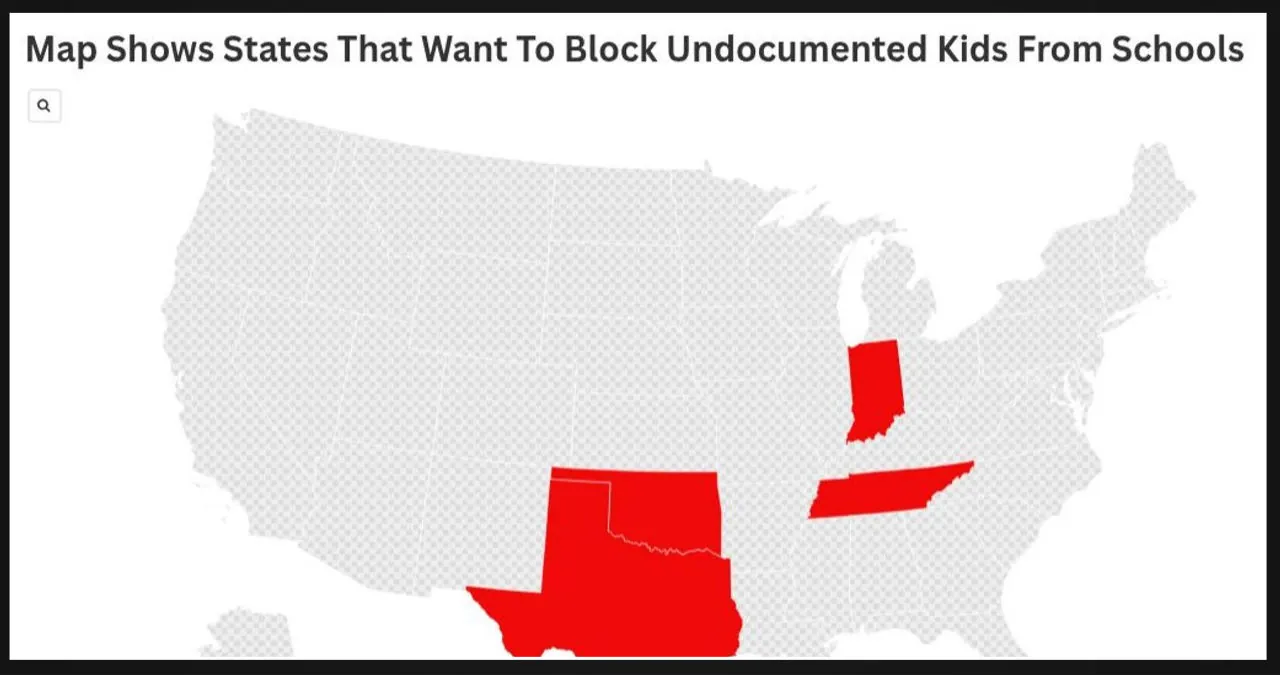Several Republican-led states are currently introducing legislation that aims to prevent undocumented children from attending public schools. This move directly challenges the Supreme Court’s 1982 landmark ruling in the case of Plyler v. Doe, which guarantees free public education for all children, regardless of their immigration status.
If these measures are put into effect, they could have a major impact on the education and future opportunities of immigrant children throughout the United States.
Newsweek has created a map that highlights the states where measures have been proposed to prevent students without legal status from attending public schools.
Why It Matters
This Article Includes
Republican-controlled states such as Tennessee, Oklahoma, Indiana, and Texas are currently considering the implementation of bills aimed at supporting President Donald Trump’s tough stance on immigration and reducing educational rights for undocumented children.
Immigration played a crucial role in Trump’s 2024 campaign and contributed to the Republicans’ return to power. According to a recent poll conducted by the New York Times/Ipsos, both Democrats and Republicans acknowledge that the immigration system is flawed. However, there is a divergence of opinions among Americans regarding the implementation of policies like deportations.
What to Know
In the landmark 1982 Supreme Court case of Plyler v. Doe, the right of children from undocumented immigrant families to attend public schools was upheld. The court ruled, by a narrow 5-4 majority, that it would be unconstitutional to deny children an education solely based on their immigration status. Nevertheless, there have been debates among conservative lawmakers regarding whether immigrants without legal residency should continue to enjoy this right.
According to Justice William Brennan, the Fourteenth Amendment safeguards the rights of “anyone, whether they are a citizen or a stranger, who is governed by the laws of a State and extends its protection throughout every corner of a State’s territory.”
The administration appears to have a particular interest in undocumented children. President Trump has taken action by signing an executive order that terminates birthright citizenship for individuals born in the United States to undocumented parents. Moreover, he has granted authority to ICE to apprehend migrants who are believed to be in the country unlawfully, especially those who may be located in or around schools.
Tennessee
Tennessee lawmakers are currently reviewing a bill that grants public schools the authority to refuse enrollment to undocumented students.
House Majority Leader William Lamberth, the person responsible for introducing the legislation, believes that it is only fair for taxpayer dollars, which are primarily contributed by legal residents and U.S. citizens, to be utilized for the education of children who are lawfully residing in Tennessee.
House Bill 793 declares that school districts and public charter schools have the authority to either accept or reject the enrollment of a student who is residing in the United States unlawfully.
Democratic lawmakers are strongly against the measure, cautioning that it poses a threat to educational rights. According to State Senator Heidi Campbell, who spoke to Newsweek, she believes that the bill is discriminatory.
Oklahoma
Oklahoma is considering implementing a new policy that would mandate parents to provide proof of U.S. citizenship or legal immigration status when enrolling their children in public schools.
The measure was approved by the state’s Board of Education last month, but it still requires approval from lawmakers and the governor before it can be implemented.
Ryan Walters, the Republican State Superintendent, has introduced a policy that aims to track and report the enrollment numbers of undocumented students in schools. This policy does not prohibit undocumented students from attending school, but rather seeks to gather data regarding their enrollment.
Walters has expressed his endorsement for Trump’s stringent immigration policies, which includes granting permission for Immigration and Customs Enforcement (ICE) agents to carry out operations within Oklahoma schools.
Texas
Starting from the 2025-26 academic year, Texas House Bill 1512 mandates school districts to accurately tally students who are not U.S. citizens or those whom they reasonably suspect to be non-citizens.
This Texas bill mandates that public school districts report the number of students they are aware of or reasonably believe are not U.S. citizens using the Public Education Information Management System (PEIMS). Although the bill does not grant schools the authority to deny admission based on citizenship status, it requires the state to annually seek reimbursement from the federal government for the expenses incurred in educating these students. The commissioner of education will establish guidelines to implement these measures while safeguarding student privacy.
Indiana
Introduced on January 13, House Bill 1394 aims to provide school districts with the power to reject enrollment to undocumented immigrants. The bill suggests that if a school district finds sufficient evidence to support the claim that a child is unlawfully present in the United States, they can refuse admission. Additionally, the bill mandates schools to disclose information such as the number of undocumented students, their English learner status, the count of bilingual instruction staff, and the attendance and truancy rates of these students to the state.
What People Are Saying
According to Clay Robison, a spokesperson for the Texas State Teachers Association, they expressed their support for Biden’s policy on immigration restrictions for schools, places of worship, and certain other locations. Robison expressed disappointment over the decision of Trump to rescind this policy.
Teachers and other school staff are feeling apprehensive and, in some cases, angry. Their primary responsibility is to ensure the safety of their students and protect them from any potentially harmful situations.
Tanya T. Coats, President of the Tennessee Education Association (TEA), expressed her views to Newsweek, stating that the primary responsibility of public-school educators in Tennessee is to provide education to all students without discrimination. Coats emphasized that educators should not be involved in determining the legal status of students or their families, urging the General Assembly to refrain from placing this burden on them.
What Happens Next
Republicans across the country are actively working to implement Trump’s agenda at the state level, as immigration continues to dominate the national conversation.

